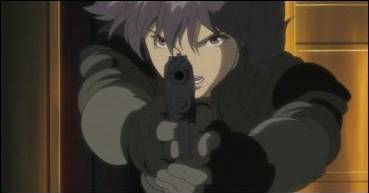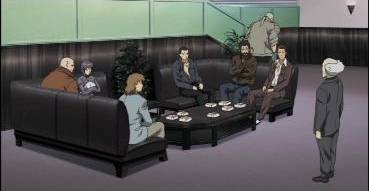|
Ghost
in the Shell: Stand Alone Conmplex 2nd Gig, Volume 2
is released by Manga Entertainment on 13th March. My colleague
Rulke reviewed the first
volume earlier in the year; therefore, I won't go into
too much detail on the overall story of the series, as I
feel he's explained it well. You may also like to read Slarek's
review of Ghost
in the Shell 2: Innocence; it features the same
characters and settings.
This
volume starts to answer a lot of the questions posed about
who or what the Individual Eleven are, their ideology, and
whether or not the situation is the same as the "Laughing
Man" incident covered in the first series of Stand Alone
Complex. In addition, it continues the themes of political
intrigue and in-fighting between the various departments
of the Japanese government, especially in relation to the
controversial Refugee situation that seems to be the focus
of the Individual Eleven's terrorist activities.

Each
of the four episodes featured in this volume deal with what
seems to be an isolated terrorist incident, but subtle (or
not-so-subtle) background clues point to all of the events
being linked somehow to the Individual Eleven.
In Inductance, the Prime Minister receives a death threat
from the Individual Eleven, and Section Nine is assigned
to protect her. However, the Prime Minister's annual visit
to the temple puts her at risk from a prosthetic-bodied
assassin.
Excavations
puts Togusa on the trail of a dead man supposedly connected
to terrorist activites. While investigating, he uncovers
evidence of a mysterious government conspiracy – and realises
that the dead man might just be an innocent victim.
Section
Nine are called upon to escort supplies of plutonium in
Pu239 – but what interest does the enigmatic government
agent Goda have in both their operation and the search for
the Individual Eleven?
And
in Free Food, Batou and Togusa run surveillance on
a suspected member of the Individual Eleven, not knowing
that Section One is watching the same man. In the midst
of conflicting information, is the suspect what he seems?
Each
episode comes with a short featuring the three hyperactive,
ultra-enthusiastic Tachikoma vehicles performing some strange
activity and (more often than not) being chased offstage
by a large enemy robot. The ending credits pay homage to
the seminal arcade classic, Dig Dug, and the shorts
overall serve to offset the gritty seriousness of the main
show.
The
animation differs slightly depending on what part of it
you're looking at. In long shots, buildings (especially
the ruined skyscrapers) are very detailed, while the design
of the various vehicles (including the aforementioned Tachikomas)
are excellent, making good use of CGI in some cases. The
characters are drawn using mostly straight lines, with very
few rounded edges. Like most animé series, SAC
provides plenty of fanservice, often having Major Motoko's
breasts in prominent view, though stopping short of gratuitous
panty-shots – clothing for the Section Nine operatives is
more sealed-in than flowing, sometimes owing much to The
Matrix.

The
English dub is, in my mind, not the best it could be. For
starters, whoever wrote the dub has tried to fit far too
much information and hyperbole into the character's speeches.
I often heard the voice-actors Peter-Pipering their lines
to try and lip-synch all of it, and as a consequence, it
is hard to follow – coming across as monologues most of
the time. The lines themselves are sometimes lacking in
emotion.
In
the music department, Yoko Kanno (of Cowboy Bebop
fame) shows off her seemingly-endless versatility, providing
track after track of pumping techno beats, mainly used for
the action scenes. While this style of music doesn't really
interest me – I far preferred her jazzy soundtracks for
Bebop – it sets the scene well enough.
To
me, the most unnerving part of Stand Alone Complex is not the political themes or the terrorist action sequences
– it's the fact that replacing body parts with cybernetic
implants has become commonplace and accepted as part of
the characters' worldview. There are even people with bodies
that are fully cybernetic, with only their brains remaining
as "human". Although this is one of the major points of
the Ghost in the Shell franchise, I still
find myself asking if humanity will ever go so far down
the road of prosthetics and cybernetics to wind up as dependant
on technology as the Ghost characters are.
In
conclusion, Stand Alone Complex 2nd Gig
strikes me as a series that tries to be as stand-alone as
its title, but all too often places too much emphasis on
the backstory of the Ghost in the Shell world – viewers
are expected to have seen the first series and the movies
in order to fully appreciate its complexity, and I feel
that this is a detraction from what would otherwise be a
solid politically-based animé series. The intricacies
of the plot will no doubt go over the heads of some animé
viewers; I wouldn't reccommend it to everyone.
16:9
and enhanced for widescreen TVs, the picture quality is,
like the first volume, very good, with good colour reproduction
and detail and no evidence of obvious comperssion artefacts
or edge enhancement.
The
sound options are Dolby 2.0 stereo, 5.1 surround and DTS,
each in eithe Japanese or with the English dub. Once again
the DTS dub is on the second disk. of the three, the DTS
has the edge, having a little more punch than the 5.1, though
both surround tracks use the rear speakers well for sound
effects. Music always plays well and there is some effective
LFE usage where appropriate.
Bonus
features on the first disc are two interviews with character
designers Takayuki Goto (12:17) and Tetsuya Nishio (9:29).
These offer insights into the design process of the characters
who are newly introduced to the series, such as the cybernetic
Kuze – whose appearance was originally based upon actor
Takeshi Kaneshiro.
The
second disc has Manga's Art of Animé promotional
video (2:10), a Coming Soon from Manga trailer (2:10)
and trailers for Millennium Actress and Ghost
in the Shell 2: Innocence.
Like
the first volume, and Innocence, Manga
have chosen to present Volume 2 as a "special" two-disc
edition, but haven't provided any real reason for doing
so – all you get on the second disc are DTS audio versions
of the same four episodes. As Slarek remarks in his review
of Innocence,
it smacks slightly of false advertising.
|